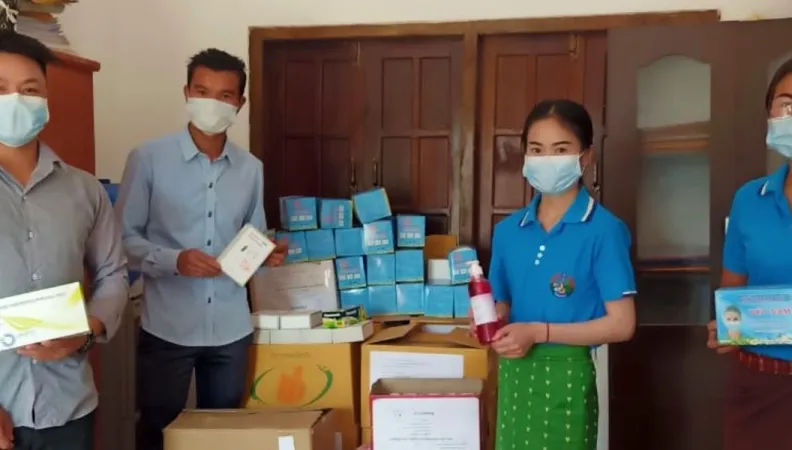Share the page
“In Laos, NGOs are Mobilizing to Combat Covid-19," Elisa Fily
Published on

As the COVID-19 epidemic quickly spreads, an NGO consortium has provided a rapid, targeted response to the material and information needs in the provinces of Laos. Elisa Fily, the project advisor working in the Cooperation Committee with Laos (CCL), discusses the wide range of measures that have been implemented.
What difficulties does Laos face during the COVID-19 epidemic?
Elisa Fily: Laos is one of the least developed countries and its healthcare services are less developed than its neighbors in Thailand, Vietnam and China. Because of this increased vulnerability, prevention and the dissemination of information are very important, including the measures already put in place, such as the lockdown.
The province of Phongsaly, where the CCL is currently at work, is particularly exposed to Covid-19 risks given that people there routinely cross the border into China for work and vice versa. So, it is essential that the people there receive information on the healthcare facilities that are equipped to respond to the crisis, as well as the appropriate habits and behavior for people to adopt.
How are you currently responding to these challenges?
We are working with an NGO consortium (including Save The Children, Care and Child Fund) on a project focusing on four provinces in Laos, which is financed by the European Union and Agence Française de Développement . Each NGO is dedicated to one subject. In cooperation with 13 health centers, the communities of 90 villages and the authorities from the province of Phongsaly, the CCL is working on nutrition and maternal and child health issues. Over the past two years of the project, we have already led training programs in the health centers, provided basic equipment, and created a network of facilitators in the communities, among other initiatives.
When the health office of Phongsaly asked us to help deal with the epidemic and send equipment, we already had an active and efficient network that we were able to mobilize, even in the most remote villages. We have coordinated with other NGOs in the consortium, which have received similar requests, to buy the requested equipment and supplies through the redistribution of the project’s funds. Save The Children has overseen the operation, and the government has handled deliveries.
In only two weeks, we have succeeded in delivering 390 boxes containing 50 surgical masks each, more than 1,000 large bottles of hand sanitizer gel, 130 boxes containing 50 gloves each, and thermometers to the 13 health centers. Other NGOs in the consortium have delivered medical supplies to health centers in the provinces where they operate, making for a total of 90 equipped health centers.
Furthermore, we are preparing literature in the local dialect to help raise awareness about the virus. Along with educational material sent by the World Health Organization, it will be distributed through our various contacts in the field to people in remote villages who do not understand the Lao language.
What more have you planned for the coming weeks?
First, the health department from the province of Phongsaly has asked us for more supplies, this time for hospitals in the province. We are going to try to meet that demand. Then, we are starting a telephone survey with the health services in the three districts of the province, the 13 health centers, and a selection of village chiefs. It will concern the way in which they receive information, how suspected cases are handled and the responses given, what the educational needs are as well as the beliefs that are formed when confronting the virus.
The results of the survey should be available in the next two weeks. The goal is to have an accurate analysis of the situation to help us target our future actions. Our network will play a very important role since it will enable us to stay in contact with various players and request information in a very short period of time. In this type of crisis situation, the in-field NGO presence like that of the CCL is valuable because it provides a quick, nearby response to the people’s needs.
Aside from this initiative, AFD is bolstering its support for NGOs to respond to the health and nutritional emergencies tied to the COVID-19 crisis. Some €150 million in grants will be provided, first and foremost to African countries. Furthermore, in conjunction with numerous governments, AFD is preparing a long-term response to the health, social, economic and financial impact of this crisis by providing €1 billion in loans. These funds will help provide support for healthcare and struggling regional and local communities, as well as budgetary support for national economic stimulus plans. The objective is to start preparing now for the redevelopment and recovery of the most vulnerable systems and help them become more resilient.
